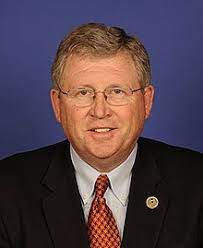
As he continues his recuperation for a broken hip socket from a recent ranching accident, Oklahoma Congressman Frank Lucas participated remotely during Tuesday’s House Science, Space and Technology Committee’s review hearing on the CHIPS and Science Act.
He began by laying out his expectations for an informative hearing with productive discussions about the Department of Commerce and work to support American competitiveness in semiconductors.
“The CHIPS and Science Act was passed to achieve two goals – to bolster the domestic semiconductor industry and to support the basic research and fundamental science that keeps America at the cutting edge of scientific development,” said Lucas, in his opening remarks. “The bill doubles down on basic R&D at the Department of Energy (DOE), National Science Foundation (NSF), and National Institute of Standards and Technology (NIST).”
Lucas reminded the attendees that the chips portion of the bill will build factories now but the science portion will build American technology for generations to come.
He mentioned there have been multiple hearings on the research provisions in CHIPS and Science but this is the first hearing to focus on the chips incentives program.
“That program was given $50 billion in mandatory funding to increase domestic semiconductor manufacturing, research and development,” said Lucas. “That’s a significant commitment, and it’s crucial that these taxpayer funds are managed effectively and support the Congressional intent of the legislation.”
He explained the intent was to build up the chips production to shore up the supply chain, stay ahead of our adversaries and reclaim our global competitiveness in this critical industry.
Lucas expressed his concern “that the first call for funding proposals came with a number of stipulations that are clearly more about fulfilling a political agenda than they are about building our chips manufacturing capabilities.”
“Extraneous provisions like requiring fabs to provide childcare or encouraging unionized workforces are less about building up domestic chip production than they are about pursuing a social agenda,” said Lucas. “They add time and expense to fab construction and operation and we’re working with a limited pool of resources on both of those.”
Lucas concluded his statement with “Money that goes to meeting unrelated requirements is money that doesn’t go to bolstering domestic semiconductor production. It’s important that we get this right not just for this program, but because this will affect our ability to make similar commitments in the future.”
He encouraged the U.S. Department of Commerce to keep in mind the Congressional intent of moving quickly and efficiently to build out the nation’s semiconductor industry.






